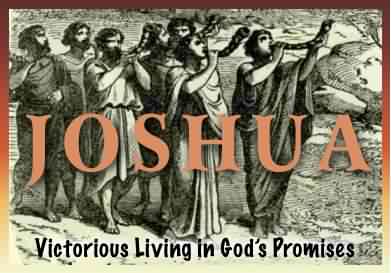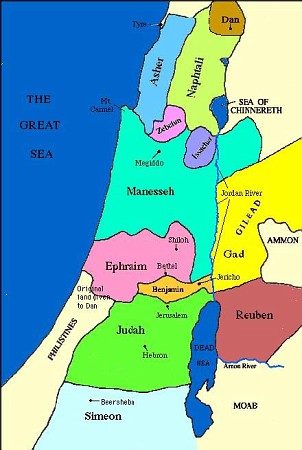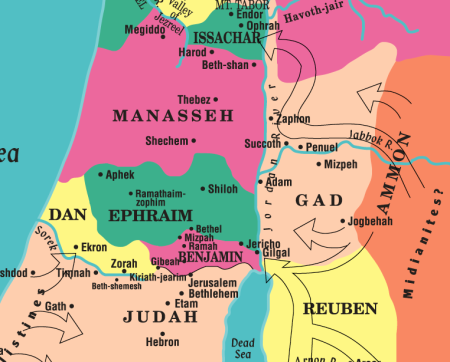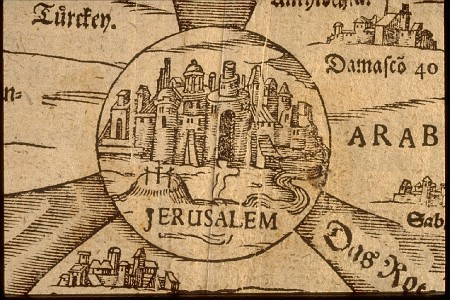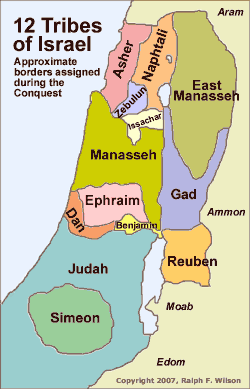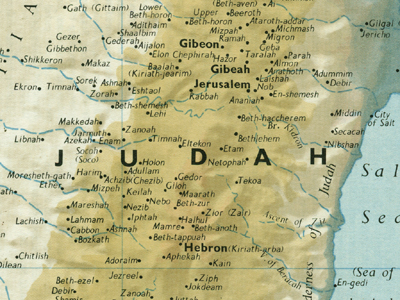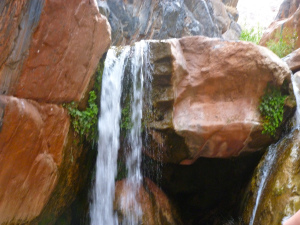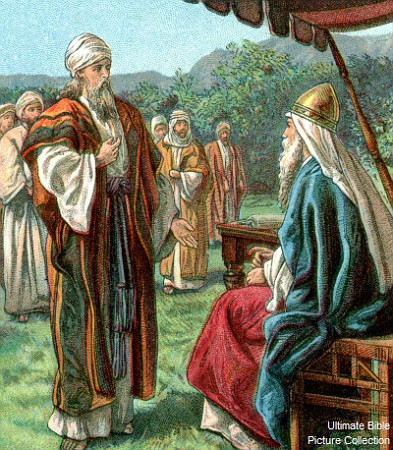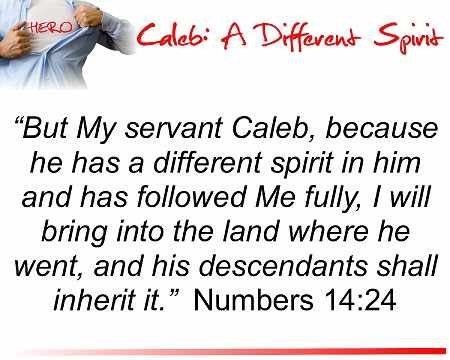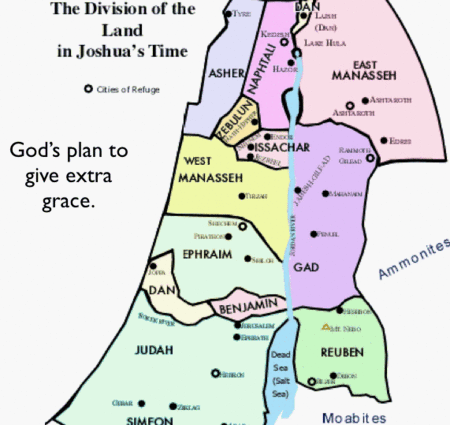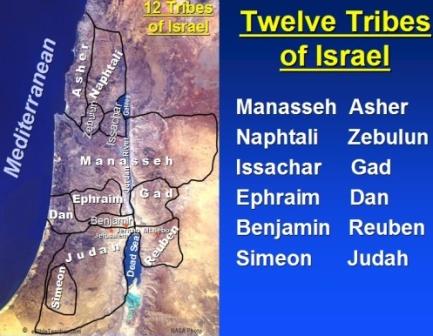The lot was cast for the sons of Joseph. The land of their inheritance is described. (vs.1-3) and shown on the map below. Who were the 2 sons of Joseph? vs. 4
In this chapter, the territory that was given to the sons of Ephraim are described. (vs.5-9) ... This included the cities that were set apart for the sons of Ephraim. Where was their inheritance in the "midst" of ... or rather "combined with"? vs. 9
Who were the unable to drive out that lived in the city of Gezer? vs. 10
Rather than drive them out, what did they do with them? vs. 10
JOSHUA 17 
Who was Joseph's firstborn? vs. 1
What blessing did Jacob give to Manasseh?
Genesis 48:20
What blessing did Moses give to Manasseh?
Deuteronomy 33:17
Back to Joshua 17. Who was Manasseh's firstborn? vs. 1
What two cities were given to Machir, the firstborn of Manesseh, and why were they given to him? vs. 1
What were the names of the other families of Manesseh that received their appointed inheritance? vs. 2
Name 6
Zelophehad, the son of Hepher, the son of Gilead, the son of Machir, the son of Manasseh, did not have sons; only daughters. What were their names? vs. 3
Name 5
These daughters had previously asked Moses for an inheritance from their father and they were told that they would receive it. They reminded Elezar the priest and Joshua at this time. What were they given? vs. 4
How many portions fell to Manasseh and why? vs. 5,6
What lands belonged to Manasseh? vs. 5,6
Name 2
The borders for the land appointed to Manasseh is given in vs.7-11. Who did the land of Tappuah belong to? vs. 8 What part belonged to the sons of Ephraim? vs. 8
Note: As the first born of Joseph, Manasseh received the double portion of the inheritance, despite Ephraim's greater blessing of influence and prosperity. The tribe of Manasseh received a double portion of land upon Israel's conquest. Manasseh received land in the Transjordan, east of the Jordan, and a large portion of land on the west of the Jordan. The tribe of Manasseh, thus, was the only of the 12 tribes of Israel to receive an inheritance on both sides of the Jordan River.
Why couldn't Manasseh take possession of some of the cities in the land? vs. 12
When the sons of Israel became strong, what did they do with the Canaanites that remained in the land? vs. 13
What did the sons of Joseph ask Joshua concerning the portion they were given? vs. 14
Where did Joshua tell them to take a place for themselves since the hill country of Ephraim was too narrow for them? vs. 15
Why did the sons of Joseph not believe they could take the valley where the Canaanites lived? vs. 16
What did Joshua say to the house of Joseph, both Ephraim and Manesseh, concerning their ability to drive the Canaanites out of the land? vs.17,18
Note: Unfortunately, the tribe of Manasseh did not drive out these Canaanites. Joshua's charge was not realized until the time of David and Solomon, during the United Monarchy. These Canaanite strongholds, coupled with Israel's lack of faith in certain instances, prevented Israel from fulfilling the order by God, given through Moses and Joshua, to inhabit the land completely.
Applications:
Ephraim was not able to drive out the Canaanites who lived in Gezer, making them slaves instead. What had God told all of Israel to do to all of the inhabitants of the land when they possessed it?
Numbers 33:55
What did the Lord tell us to do about those things that made us compromise our morals and fall into sin and temptation? (Although you may not do this literally, what kind of things could you do to get radical with temptations?)
Matthew 5:29-30
We cannot make sin our slave as they made the Canaanites theirs. What happens if we continue to commit sin? Who becomes the slave? How is freedom acheived?
John 8:31-36
Romans 6:12-18
Younger people should not assume that the sins they battle against will be easier to deal with as they grow older. The reality is if they allow those sins to grow and take root now, they will continue to get harder to deal with throughout the Christian life. A garden is easier to weed when the weeds are young and tender and the soil has not hardened. The deceitfulness of sin hardens the heart. Comment on the verses below:
Ecclesiastes 12:1-7
Psalm 119:9-11
Hebrews 3:13
1 Corinthians 15:33
2 Timothy 2:22
Back to thoughts of Joshua 16 & 17. It's not true that they "could not" drive them out, but that they "would not" do it. How do we know they had the power to do it?
Joshua 23:9,10
What have we been told about the power within us to be more than conquerors over sin in our own lives?
Romans 8:31-37
1 Corinthians 15:56-58
2 Corinthians 2:14
2 Corinthians 10:4,5
Ephesians 6:10-13
1 John 5:4
Note: This sort of compromise seems innocent, but it became the way that much idolatry and immoral worship came into the people of Israel. This is one reason why we see so many struggles in the days of the Judges. The Israelites did not fully conquer for two reasons. First, they wanted peace at any cost. Second, they wanted wealth. For the sake of ease and money, they disobeyed God and fell short of what He had for them - as we do today also.
Summarize the lesson and post a prayer if you would like.
